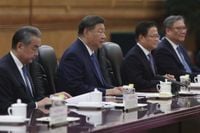On September 29, 2025, Chinese President Xi Jinping intensified his campaign to persuade the United States to make a significant change in its long-standing diplomatic language regarding Taiwan—a move that could have far-reaching consequences for cross-strait relations and the broader geopolitical landscape. According to sources familiar with the matter, Xi has directly asked the Trump administration to officially declare that it "opposes" Taiwan independence, a shift from the nuanced, decades-old phrasing that has underpinned U.S.-China-Taiwan relations since the normalization of ties between Washington and Beijing.
For Xi Jinping, this is not merely a matter of semantics. As reported by Bloomberg, the Chinese leader views the moment as ripe for diplomatic leverage. With President Trump eager to finalize a trade deal that could bolster his administration’s economic record, Xi sees an opportunity to extract a major concession on what he considers China’s top strategic priority: the status of Taiwan.
For decades, the United States has adhered to a policy of "strategic ambiguity" when it comes to Taiwan. The official U.S. position, as articulated in communiqués dating back to the 1970s, acknowledges the "One China" principle but stops short of explicitly opposing Taiwan independence. This delicate balance has helped maintain peace and stability in the Taiwan Strait, even as tensions have occasionally flared.
However, Xi’s latest push seeks to upend this balance. By asking the Trump administration to formally oppose Taiwan independence, Beijing is aiming for a diplomatic victory that would signal international acceptance of its claim over the self-governing island. Such a declaration would mark a dramatic departure from U.S. policy and could reshape the dynamics of U.S.-China relations, as well as Washington’s ties with Taipei.
According to a person familiar with the discussions—who requested anonymity due to the sensitivity of the matter—China’s request is unequivocal: the Trump administration should state, for the record, that it "opposes" Taiwan independence. This demand, if met, would represent a significant win for Beijing, reinforcing its narrative that Taiwan is an inalienable part of China and undermining any international support for the island’s de facto autonomy.
Xi’s strategy is rooted in a keen awareness of the political climate in Washington. As reported by Bloomberg, the Chinese leader has identified President Trump’s desire for a trade breakthrough as an opening to press for his own top goal. The logic is straightforward: Trump, facing mounting pressure to deliver economic results, may be willing to offer diplomatic concessions in exchange for progress on trade.
"The Chinese leader views the president’s eagerness for a trade deal as an opportunity to press for his top goal," Bloomberg noted, underscoring the calculated nature of Beijing’s approach. Xi’s team believes that the prospect of a historic trade agreement could entice the Trump administration to reconsider its position on Taiwan, particularly if the change is framed as a necessary step toward broader bilateral cooperation.
Yet, the stakes could hardly be higher. For Taiwan, any shift in U.S. policy would raise immediate concerns about its security and international standing. The island’s government, which operates independently and holds democratic elections, relies on implicit American support as a deterrent against Chinese aggression. A formal U.S. statement opposing independence could be interpreted in Beijing as a green light to step up pressure on Taipei, both diplomatically and militarily.
For the United States, the decision is fraught with complexity. On one hand, securing a trade deal with China could offer tangible economic benefits and provide a political boost for the Trump administration. On the other, acceding to Beijing’s demand risks alienating key allies in the region and undermining the credibility of America’s commitments to democratic partners. It could also embolden China to pursue further assertive actions, not just in the Taiwan Strait but across the Indo-Pacific.
Observers in Washington and beyond are watching closely to see how the Trump administration responds. While the White House has not issued an official statement on the matter, analysts note that any shift in language would be carefully scrutinized by Congress, U.S. allies, and the international community. The issue of Taiwan’s status is deeply sensitive, touching on questions of sovereignty, democracy, and the balance of power in East Asia.
Historically, U.S. policy toward Taiwan has been shaped by a series of carefully worded statements. The 1972 Shanghai Communiqué, for example, acknowledged that "all Chinese on either side of the Taiwan Strait maintain there is but one China and that Taiwan is a part of China," but did not explicitly endorse Beijing’s claim. Subsequent communiqués and the Taiwan Relations Act of 1979 have reinforced America’s commitment to peaceful resolution of the Taiwan question, without taking a definitive stance on independence.
China’s latest request, therefore, represents a significant escalation. By seeking an explicit U.S. statement of opposition to Taiwan independence, Beijing is attempting to close the door on any ambiguity and force Washington to take sides. For Xi Jinping, achieving this goal would be a crowning diplomatic achievement, signaling to domestic and international audiences alike that China’s rise is being recognized and respected by the world’s leading power.
At the same time, the move is not without risks for Beijing. If the Trump administration rebuffs the request, it could harden attitudes in Washington and fuel calls for closer ties with Taipei. It could also galvanize support for Taiwan among U.S. allies, particularly in Japan and Australia, who share concerns about China’s growing assertiveness in the region.
For now, the outcome remains uncertain. The Trump administration must weigh the potential benefits of a trade deal against the strategic costs of altering its Taiwan policy. As the negotiations continue behind closed doors, one thing is clear: the stakes for all parties involved could hardly be higher, and the decisions made in the coming weeks may shape the future of the Asia-Pacific for years to come.
As Xi Jinping presses his case and Washington considers its options, the world watches—a reminder that in international diplomacy, words matter, and so do the moments when they change.

